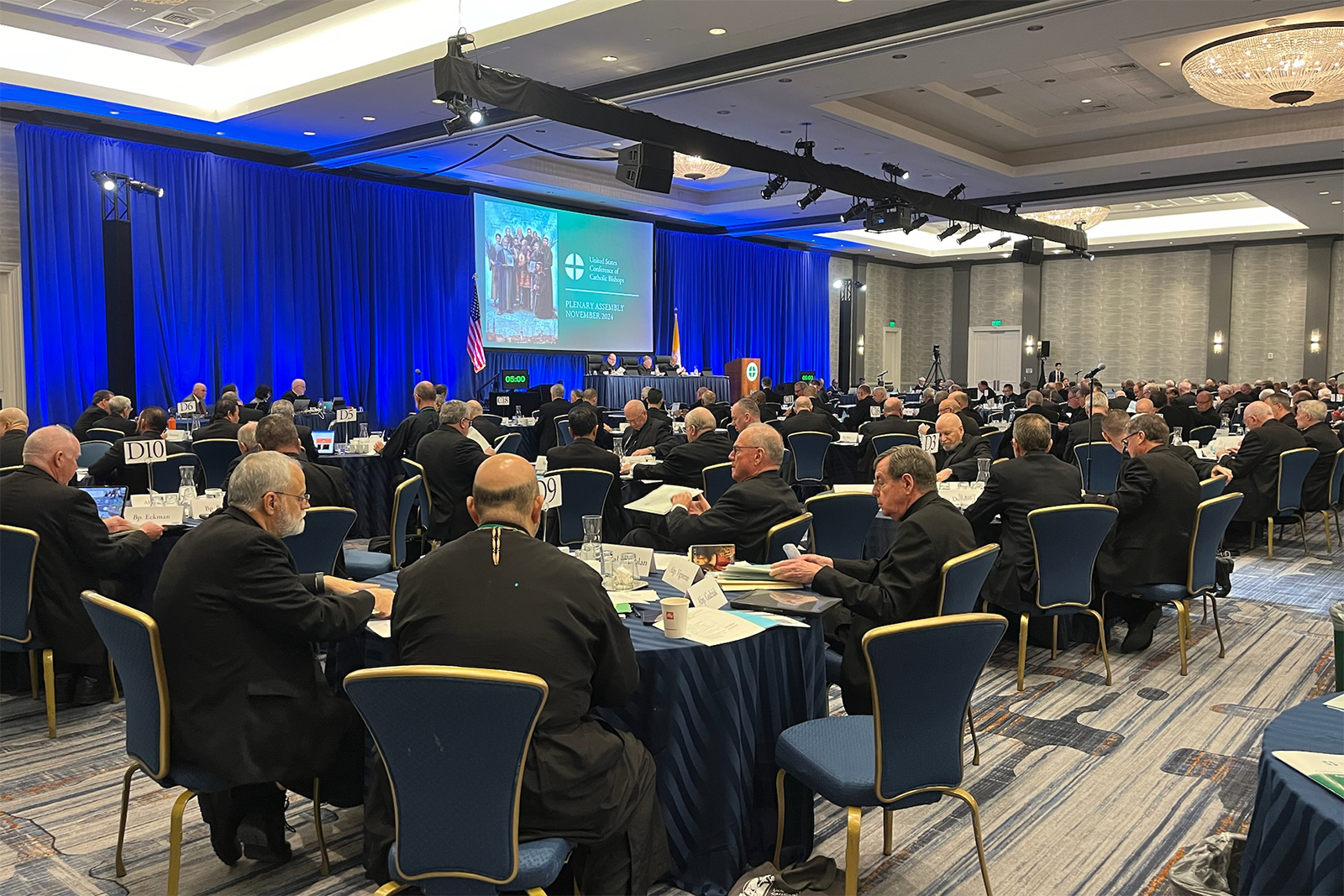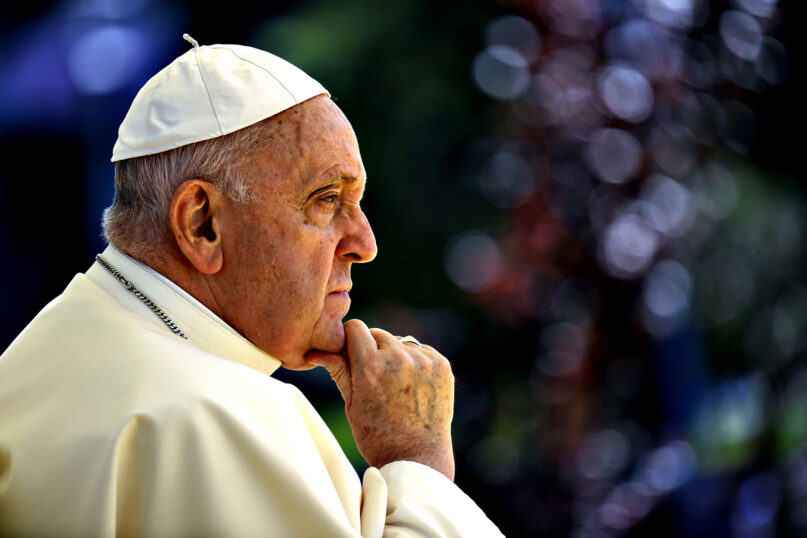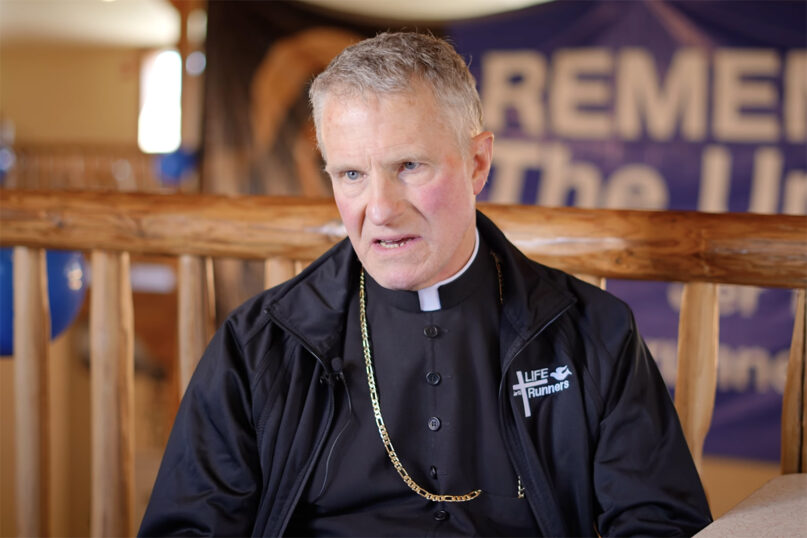
(RNS) — The American church is divided, with some, especially young priests, wanting to reject the legacy of Pope Francis, while others embrace it and want to go even further. Meanwhile, the church is hemorrhaging young people so there are now more “nones” in America than Catholics.
American society is also divided, with some seeing President Donald Trump as their savior while others see him as a threat to democracy. People do not trust those who disagree with them, and they are refusing to dialogue and listen to one another. More and more people see violence as a way to resolve political disputes.
Meeting in Baltimore next week (Nov. 10-13), the U.S. bishops will have an opportunity to face these challenges. Will they have something to say to Catholics and the American people, or will they waste this opportunity with discussions that have no relevance to their people?
Based on the little these meetings have accomplished in the recent past, I fear that the Baltimore meeting will be a bust.
The bishops themselves are divided. Many were appointed under the papacies of John Paul II and Benedict XVI and are nostalgic for the past.
They saw Francis as a source of uncertainty and confusion. He freed theologians from the hierarchical controls imposed by the two previous papacies. He reached out to those who had been shunned by the church. He did not see opposition to abortion as an excuse for ignoring issues of social justice, peace and the environment.

Pope Francis meets students at Portugal’s Catholic University on Aug. 3, 2023, in Lisbon, Portugal. (Vatican Media)
Many bishops also felt he undermined their authority by attacking clericalism and promoting synodality. They bristled when their decisions were questioned.
These bishops were not sad when Francis died. They hope his successor will bring back “the good old days.”
There are also bishops who embraced the papacy of Pope Francis. They felt the church should become less legalistic and more pastoral. They, like Francis, wanted everyone to feel welcomed in the church, including divorced and remarried Catholics and members of the LGBTQ community. They recognized the new ways were not easy but an organism that does not change dies.
These bishops are foolishly called “liberals” by the media. They are not liberals. Neither was Pope Francis. In comparison with the Catholic population (let alone ex-Catholics), the Francis bishops are moderates on church issues. None of them is calling for married priests, women priests or a change in the church’s teaching on birth control, abortion or sexual ethics.
They, like Francis, simply don’t see the sense in constantly haranguing the public on these issues when everyone knows the position of the Catholic hierarchy. They believe that teaching without compassion will fail.
Because of these divisions, the bishops will hide from the media in executive session during much of their meeting in Baltimore. The bishops’ media office acknowledges that the topics to be discussed behind closed doors include “the ongoing implementation of the synod” and “best practices to continue the instruction of Laudato si’, and the apostolate of the laity.”
I have never been an absolutist saying all meetings of the bishops must be in public. I supported the bishops when each year they devoted a half day for meetings in private.
But having half the meeting behind closed doors is a scandal. The bishops are admitting they cannot in public “freely and candidly discuss” topics central to the papacy of Pope Francis: synodality, “Laudato si’” and the apostolate of the laity.
This is tragic. The bishops should be modeling synodality for their priests, their people and the nation. What better way to do that than to admit that there are differences of opinion but show how they can listen and dialogue with one another.
Most of the topics on the public agenda are boring and irrelevant to the lives of most Catholics. The exception is “the evolving situation impacting migrants and refugees.” Here the bishops are more liberal than the Catholic population.
For generations, the bishops have welcomed and supported migrants and refugees, both Catholics and those of other faiths. They have often done this with federal dollars, but funding has been cut off by the Trump administration.
The bishops are united in supporting migrants and refugees but divided on tactics.
Some bishops want to be more confrontational. Others fear confrontation would cut off dialogue with the Trump administration and ensure government funding would not be restored. The bishops have traditionally avoided inflammatory rhetoric, but many are impatient with the administration’s hostility to immigrants.
Will the bishops condemn the harsh tactics used by U.S. Immigration and Customs Enforcement against migrants? Will the bishops condemn the use of the military and the National Guard in American cities?
The current president of the U.S. Conference of Catholic Bishops, Archbishop Timothy P. Broglio, is also head of the Archdiocese for the Military Services. So far, he has dodged questions on how chaplains should advise troops on the morality of their deployment on American soil, which many legal scholars see as illegal.
Will the bishops say something about the government shutdown if it continues into their meeting? As USCCB president, Archbishop Broglio pleaded for lawmakers and the administration to work in a bipartisan way to ensure funding of lifesaving programs and an end to the government shutdown.
He specifically mentioned the Supplemental Nutrition Assistance Program, a government program that aids needy families, as an example of an impacted program. But he said nothing about continuing government subsidies for insurance plans under the Affordable Care Act, aka Obamacare.

Archbishop Timothy Broglio, president of the U.S. Conference of Catholic Bishops, in April 2025. (Video screen grab)
Is this his way of taking sides with the Trump administration against congressional Democrats?
This will be Broglio’s last meeting as president. A new president and vice president as well as six chairmen-elect will be elected during the meeting.
There are 10 candidates for president, chosen in the usual way by polling the bishops and allowing bishops to withdraw their names if they don’t want to run. Note there will be no cardinals on the ballot, presumably because no one wanted to run.
The leading candidates for president appear to be Bishop Daniel E. Flores of Brownsville, Texas, and Archbishop Paul S. Coakley of Oklahoma City.
As a Hispanic bishop whose diocese is on the southern border, Flores can speak with authority on immigration. He was also a strong supporter of Pope Francis and a participant at the Synod on Synodality.
Coakley, as current secretary of the USCCB and an archbishop, has the advantage since archbishops usually do better in elections than bishops. On the other hand, he has never apologized for defending Archbishop Carlo Maria Viganò, the former papal nuncio to the United States, who was a vocal critic of Pope Francis and is now a schismatic.
A vote for Flores is a vote for Pope Francis and his legacy. A vote for Coakley could be interpreted by some as a vote against Pope Francis and his legacy.
A wild card in the presidential race is Bishop Robert E. Barron of the Diocese of Winona-Rochester in Minnesota. He is the well-known speaker and founder of Word on Fire, a Catholic media organization. His election would give the bishops’ conference a bigger media presence, but one the other bishops might not be able to control. Barron is used to doing his own thing.
The bishops could elect any of the other seven candidates, but these three are the most interesting.
Not mentioned in the USCCB press release is any discussion of “Faithful Citizenship,” the bishops’ statement on political responsibility, which the bishops have failed to update on a regular basis as they did in the past. If they are going to do anything before the 2028 election, they need to get going.
The church and nation are falling apart. If the bishops could speak with one voice united with the pope, they would project a moral voice worth listening to. Their voice is needed at this critical moment. They need to listen to each other and to the Spirit and then speak with a prophetic voice.
